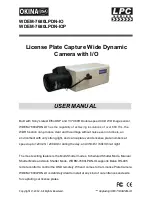
1
www.observint.com
ALI-NS2024R_CQ
180410
2.
Route an Ethernet cable from your network switch or network video recorder, and the camera
mounting location. The camera can be powered with PoE, or through a 12 Vdc source. If powering
the camera from a 12 Vdc power source, route the power cable to from the power source to the
mounting location. Power plug polarity is shown in the drawing to the right.
Do not apply power
to the power cable at this time.
3.
See the drawing to the right. Rotate
the trim ring counter-clockwise, and
then lift it off the camera assembly.
4.
Loosen the lock screw, and then
separate the enclosure and turret
module from the base.
Base
Trim ring
Enclosure and
turret module
Lock screw
5.
Unscrew the maintenance access
cover from the side of the turret
module.
6.
Insert a microSD card into the card slot
as in the drawing on the right. Push
the card in until it is fully seated and
locks into place.
7.
Reinstall the maintenance access
cover.
microSD
card
RST (reset) button*
Maintenance
access cover
*
To restore the camera with its default configuration (including
user name, password, IP address, etc. press and hold the
RST
button for 10s when the camera is power on or rebooting.
8.
Use the drill template to mark holes
for the mounting screws and drop
cable hole in the surface.
9.
Drill holes in the mounting surface for
the mounting screws, and drop cable,
if needed. For outdoor installations,
seal holes drilled in the mounting
surface to block moisture and other
contaminants.
Mounting surface
Base
Template
Screws
10. Attach the base to the mounting surface using three screws. If the drop cable will be routed through
the side of the base, lay the drop cable through a cable channel in the base before tightening the
screws.
11. To reassemble the camera,
a.
Connect the Ethernet LAN cable to the camera LAN drop cable. Protect the connection from
moisture and other contamination, if necessary. A Weatherproof Ethernet Fitting is provided.
Installation instructions for the fitting are included at the end of this document.
Camera
Ethernet switch
Network drop cable
from camera
Network cable from
router or switch
Weatherproof Ethernet Fitting installed
WARNING
!
Failure of the power or Ethernet connector due to moisture or another contaminant
is considered an installation error, which voids the warranty. If installing this
camera in a location such as an overhang, shop, garage, kitchen, etc. where high
humidity or dust is present, seal these connections adequately.
b.
If the camera is not powered using PoE (Power over Ethernet injector), connect the 12 Vdc
power cable to the camera drop cable. The polarity of the drop cable connector is shown
below.
ALI-NS2024R 4MP IP
Low Light Turret Camera
Quick Installation Guide
This document guides you through the basic steps to install and configure the ALI-NS2024R camera. This
camera features:
•
1/2.5” 2560 x 1440 pixels Progressive Scan CMOS sensor
•
Low Light 0.008 lux sensor
•
Compression standards include H.265, H.265+, H.264+, H.264, MJPEG
•
2.8 mm lens
•
120 dB Wide Dynamic Range, 3D Digital Noise Reduction
•
Full Frame Illumination Smart IR array
•
Advanced video analytics
•
Supports onboard storage, 128GB max microSD (Not Included)
•
IP67, temperature range -22 °F ~ 140 °F
For more information about the features of these cameras, please refer to the
AlibiSecurity.com/Resources.
Turret
Enclosure
Ethernet connector
Power Connector
Trim ring
Lens
IR LED
What’s in the box
Box contains this document with the items shown below.
Drill Template
Weatherproof
Ethernet fitting
Mounting
screws and
wall inserts
Step 1. Install the camera
Before installing the camera,
•
Make sure the device in the package is in good condition and all the assembly parts are included.
•
Make sure your power source matches the requirements for your camera. Power requirements are
shown in the
Specifications
section at the end of this document.
•
Check the
Specifications
section for the recommended installation environment.
•
Make sure that the mounting surface is strong enough to withstand four times the weight of the
camera (and the bracket, if used).
•
Make sure the field of view has no reflective surfaces close to the IR emitter of the camera. These
surfaces can bounce IR light back onto the camera lens, limiting performance in dark environments.
1.
Determine the best fasteners for securing the camera to mounting surface. The mounting hardware
provided is suitable for most surfaces. Note that the drop cable can be routed through the mounting
surface, or out the side of the base and trim ring.
























